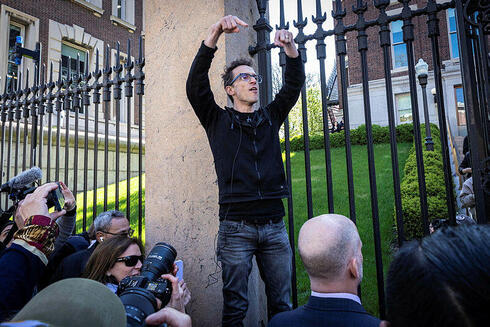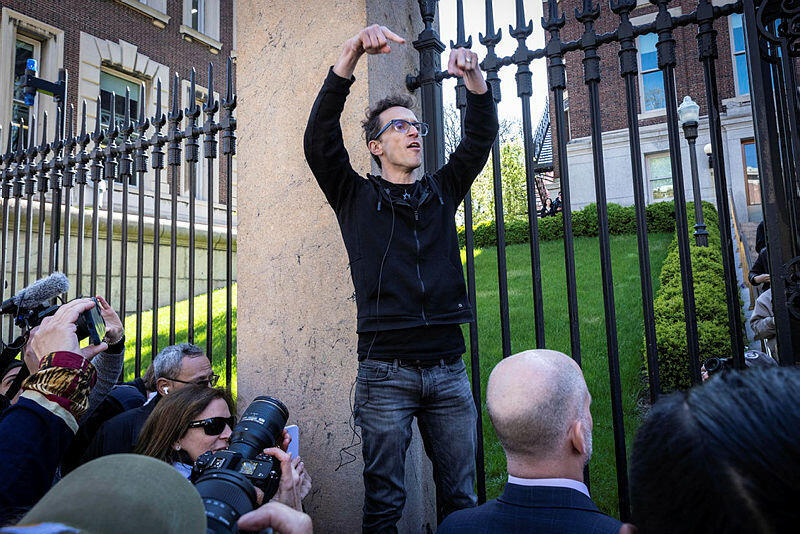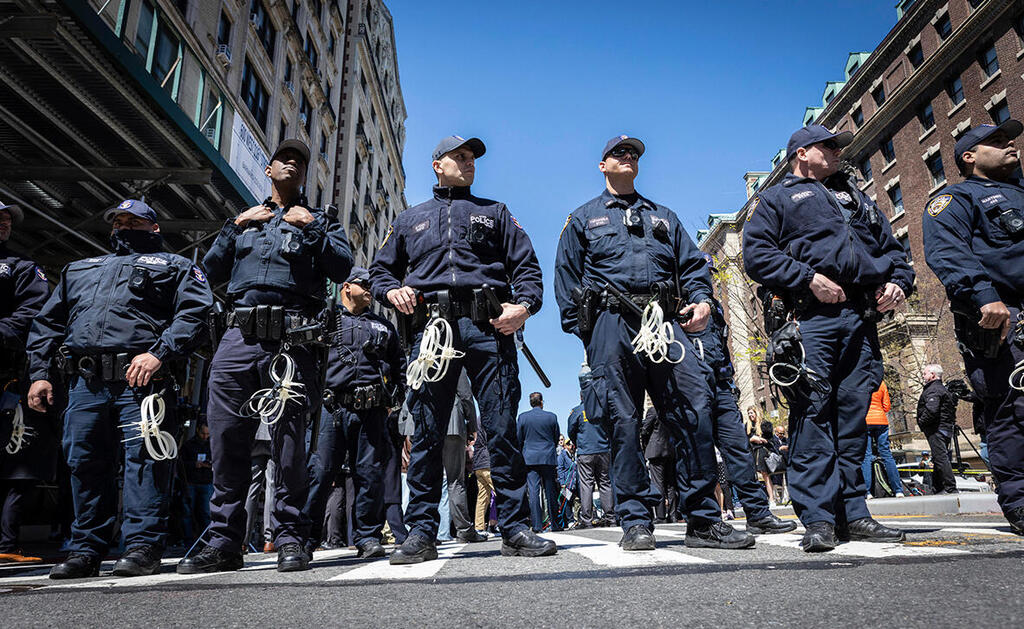
Interview
"I prefer to be unemployed than continue working at a university with Hamas supporters"
“I am very worried for the Jewish students. People are injecting terror into the campus,” says Prof. Shai Davidai, whose entrance to Columbia University was blocked amid the tumultuous anti-Israel demonstrations
Over the past week, Columbia University has been at the center of anti-Israel and anti-Semitic demonstrations in the U.S. As of today, about 200 pro-Palestinian activists have set up a tent city for demonstrations. This comes after approximately 100 others were arrested and evacuated by the police. Matters escalated to the point where Columbia's Orthodox rabbi advised Jewish students to avoid campus due to safety concerns, prompting condemnation from President Joe Biden.
On Monday afternoon, tensions peaked further when Prof. Shai Davidai, a social psychologist and lecturer at the University's School of Business Administration, was denied entry to the Morningside Heights campus. The university's chief operating officer cited safety concerns as the reason for blocking his entry.
Davidai, an Israeli-American who is considered a prominent voice in the protest against the pro-Palestinian demonstrations on American campuses and to the lax and silent response of university administrations to them, says in an interview to Calcalist that he did not seek to lead a counter-demonstration as alleged against him, but only to read the names of the abductees, and calls on Israeli public figures to publicly support the Jewish students in the U.S. in order to put pressure on American policy makers.
"Almost all the Jewish students ran away from here on Saturday evening and on Sunday, there's no other word to describe it, because they just realized they couldn't be safe on campus," he says in a phone call from New York. "The rabbi of the university, Elie Buechler, wrote in an unusual message, 'Not only can the university not protect you, the university does not allow the New York Police (NYPD) to protect you'.”
"Unlike the universities in Israel, Columbia University is open to the public, it has an open passage, and for the past week the gates have been locked and they do not allow the media, the public and the police to enter."
The university closed its gates, he said, "because there is a Hamas demonstration on campus, and they (the heads of the university) think that if they keep it inside, then they will be able to prevent it from getting bigger and bigger. They cooperate with them, they are currently in negotiations with the demonstrators."
What did you really want to do, if not demonstrate?
"I wanted to read the names of the abductees, it was important to me before Passover to read all their names, both those who we believe are still alive, and also those who, unfortunately, are not. In the end, I read them outside."
So for you this is not a demonstration? What do you call it?
"This is a lecturer who wants to be in a public area on his campus."
What do you think of the rationale for blocking your entry to campus, that this measure is meant to protect you?
"I may be wrong, I'm not a historian, but I think the last time a Jewish lecturer - not just a lecturer off the street - was not allowed to enter his campus was in Nazi Germany. That's it."
How are you feeling in general?
"First of all, I'm very worried about the Jewish students. The holiday ends tomorrow, and they want and deserve and have the right to return to campus. This was my number one goal from the beginning. And that's what I'm focused on. Second, I really don't understand how Hamas was allowed to take over the university. I am deliberately saying Hamas and not Hamas supporters, because Hamas is an ideology and they push the ideology, that makes them Hamas.
"When there are students holding a sign and saying 'Hamas - here is your next target' and pointing at Jewish students - then we have people injecting terror into the campus. And I simply do not understand how the university allowed this. And right now all of this is on the shoulders of one person, the president of the university, Minouche Shafik. The NYPD is sitting outside the university with police officers who are ready to come in and break up this illegal assembly, like they did at NYU. And the only person who doesn't allow them to do so, who stands between Hamas and the Jewish students, is the president."
Shafik was reprimanded during a congressional hearing by Republican lawmakers who called Columbia under her administration "one of the worst educational institutions in handling anti-Semitism and hate speech."
"She lied in Congress, so she should be reprimanded (Shafik claimed at the hearing that there are over 50 complaints from students about Davidai for assault, and he tweeted in response that this is a lie, and that he has never assaulted any student), but it doesn't matter to me. It matters to me that she does her job."
Personally, aren't you afraid? Both for your personal security and your academic career?
"My goal is to help. I said from the very beginning that the story here is not about Shai Davidai, it's a much bigger story. I'd rather be unemployed and know I did the right thing than keep my job at the cost of continuing to work with Hamas supporters."
Is there anything else you want to add?
"The Jewish students here have been working so hard for six months to support Israel and, in general, American Jewry and world Jewry. I think we as a country (Israel) must ensure their personal security. The commitment of the Jews to Israel should be matched by the commitment of Israel to the Jews."
How do you do that?
"I was so happy, for example, to see that President Herzog wrote something about Columbia. We have a minister for diaspora Jewish affairs. In the Knesset, there is a lobbyist for the Jewish campuses. They were in the U.S., met with students, but now is the time to apply the pressure, I don't know how, but we need political pressure, talk to senators, talk to governors. It's happening at Columbia, at Yale, at NYU, it's happening at every university, and I'm just one person, I can't fight this war alone. We do have a coalition of Israeli-American academics, but it is a logistical coalition, for the organization of specific things - we have no political power, and our voice is limited. As much as my voice is now more and more powerful it is limited. We need help from Israeli public figures, politicians and intellectuals.
"The last time we spoke was in July, regarding Israel’s fight for democracy (Davidai was attacked by a policeman during a demonstration over the judicial reform), and we have to remember - we are fighting for a Jewish and democratic state, and Jewishness is part of that. I am 100% committed to democracy, but I am also 100% committed to Israel being the state of the Jewish people. This is our duty. Now we must fight for the Jewish people."
The irony is stunning - in the summer you fought against the judicial reform and its supporters probably labeled you as an Israel hater. In light of your activity in the last six months, now they are probably eating their hat.
"I don't agree. One of the first things I thought about after I saw the policemen on Sderot fighting and getting killed on October 7 was the policeman who beat me. I thought, I hope he's okay. So it's not that I'm going to stop fighting for democracy, I'm continuing and I'll do it after we finish everything here, in Israel, but we will do it from a place of love and building, as we have always done."















